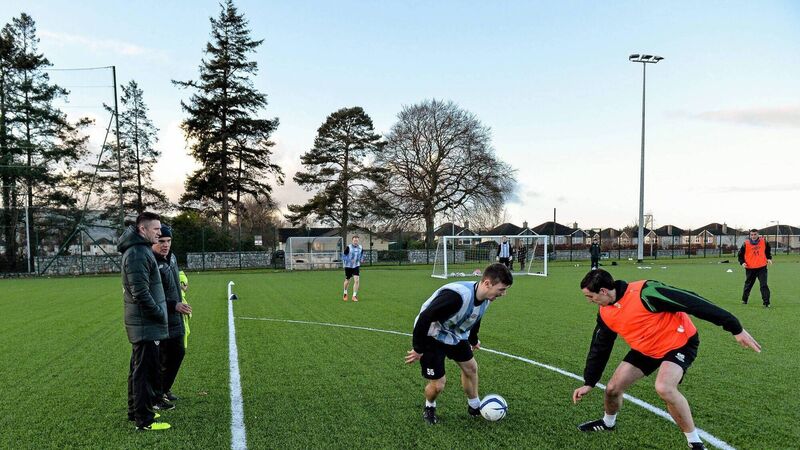Ian Mallon: Why the high cost of Uefa coach education?

2014: Former Republic of Ireland international Robbie Keane with Tom O'Connor, FAI Course co-ordinator, during an FAI / UEFA A Coaching License Course. Institute of Technology, Carlow. Pic: Matt Browne / SPORTSFILE
Uefa has spoken for the first time about the pricing of its coaching licences and badges - which are awarded by national associations - at a sometimes exorbitant rate.
Grassroots coaches can expect to pay up to €3,000 for a ‘Uefa A Licence’, while the same Level 4 standard for goalkeeping coaching - which are shorter courses - is as high as €1,640.
In a statement to The Pitch about pricing structures, Uefa said that while it “shares the costs of running the courses with member associations”, it “does not have any direct impact on the cost”.
In a survey of all five national associations in the UK and Ireland - for the only course currently available across all – the ‘Uefa A Licence in Goalkeeping’ - prices ranged from €1,175 to €4,490.
In Ireland the course is priced at €1,350 for initial entry, with €290 added-on in extras for access to e-learning and other subscriptions.
The FAI and the IFA in Northern Ireland offer the best value amongst the Irish and UK Euro 2028 partners, with Wales, Scotland and England charging more.
For its ‘A Licence’ Goalkeeping Course, Wales charges €4,450 (with a discounted price of €3,330), in Scotland you will pay €2,185, while at the FA in England the charge is €2,055.
In Northern Ireland, the same standard for goalkeeping coaching costs €1,179 – 13 per cent less than the initial costs south of the border, or up to 30 per cent less than the overall FAI price with add-ons.
When asked about the pricing structures for Uefa Pro (approx €8k), A, B and C licences, the FAI said it is “not in a position to comment” on the costs of its courses.
It is the right of any organisation not to reveal commercially sensitive information, but should coach education continue to be a commercial objective for the association or should it not be subsidised under ‘Participation’ to increase standards of coaching?
Uefa told The Pitch that while it pays €100k to the FAI to help run the courses, it doesn’t direct national associations on pricing schemes and costs.
“Uefa’s involvement is to set a benchmark for coaching standards which its member associations need to follow, when delivering their respective courses,” it said in a statement.
“However, Uefa shares the costs of running the courses with its member associations - €100,000 of funding is given to each national association on an annual basis, based on their Uefa Coaching Convention endorsement.
“Furthermore, Uefa offers a scholarship scheme for female coaches as well as a mentor/mentee scheme as it is Uefa's aim to get more and more women involved in qualified coaching.
“In order to give more opportunities for prospective coaches to become involved in football, Uefa launched its C Licence programme last year as the starting point of the core educational pathway, which will provide both an introduction to coaching and a clear development pathway for anyone looking to enhance their skills.”
The FAI currently does not have a C Licence programme available on its education application system.
Coach Education is essential to Uefa due to the increasing standards of coaching across other competitive sports in Europe, with football experiencing a sizable drop-off in the numbers of registered footballers across the continent in recent years.
In a bid to deal with this participation crisis Uefa produced a strategic programme – Grow – into which Coach Education forms a fundamental objective in the organisation’s future strategy.
In the plan, Uefa advised the FAI and all other 54 member associations to “prioritise grassroots education and mentoring” and declared that improvements would come “by supporting provision of online learning, club development, teacher and female coach education”.
It directed that a national association should provide “high-quality education opportunities which focus on providing the skills and knowledge to create an empowering environment for all players”.
The FAI’s Strategy 2022-25 certainly echoes that view under its Pillar 3 Objective – ‘Nurturing Football Pathways for All’ where it commits to ‘increase the number of qualified coaches at all levels’.
Six months into the Strategy and with the new amateur winter season almost underway, the evidence suggests that this implementation may take some time.
RORY McILROY’S endorsement deals with Nike (estimated $250m) and TaylorMade - $100m, demonstrates the sheer power of sponsorship for sport’s leading athletes.
But what is the cost to ‘own’ a piece of an Irish sports star who doesn’t have the global reach of Rory, but is still a highly valuable asset for products and brands within this country?
A disruptive new influencer in the area of endorsement is Sport Endorse, which offers brands up to 700 athletes for sponsorship with a stated value on specific activations for clients to immediately appreciate the cost.
Similarly, the 350 or so brands and companies that currently work with Sport Endorse advertise campaigns and activations for athletes and commercial agents to assess, with a fee declared – erasing the need for lengthy negotiations over price.
The company, which was co-founded four years ago by Declan Bourke, a former financial services professional, will launch a new site in the coming weeks giving access to athletes and brands – with all values stated openly to remove any confusion over costs.
“Our main focus through our platform is enabling brands, companies and elite athletes to interact around various endorsements including brand ambassador roles, promotions, appearances and even speaking’,” Bourke told The Pitch.
“If you look at the player or athlete side, ordinarily the top three to five per cent get all the work, and the others get ignored. Our platform creates a marketplace for other athletes and allows for more options for companies outside of the regular ones who get most of the work.”
Sport Endorse currently works with over 700 elite Irish sportspeople, including Kerry legend Marc Ó Sé, Rep of Ireland star John Egan and Ireland rugby international James Lowe.
It is also growing its international suite of athletes including PGA golfer Harold Varner III, NFL player Marcus Williams and NBA player Torrey Craig.
On the brand side, the company deals with Revive Active, Grant Thornton, Ladbrokes, PTSB, VHI, Muller Yogurt, Energia, Specsavers, Benetti Menswear and others.
So the cost to buy into an elite sports star in Ireland?
Irish athletes can expect to receive anywhere between €6k and €30k to lead a national campaign for a brand or company, depending on what’s required - personal appearances, social media posts and use of image across different media channels.
One-off activations can range from €1.5k to €15k for which the athlete gives his or herself over for keynote speaker gigs, panellist discussions and other single promotions.
Such transparency over pricing will set a new precedent in sports sponsorship, and one which ends ambiguity over fees – a once hyper-sensitive area in sponsorship.
HAVE you ever wondered why the more successful Irish sports are often out-funded by those which struggle in international competition?
During the recent round of Government core funding details for 2022, shared by Sport Ireland, the most remarkable aspect of the list was the sports which didn’t perform so well, outmuscling those which do.
Out of the €15m payments handed down – excluding Soccer, GAA and Rugby which received a separate ‘field sports’ stream of €10.5m – the most remarkable payment was the €1.1m that went to Swim Ireland.
It received three times more than Golf Ireland, despite the considerable international success and reputation of Irish amateur golfers worldwide.
Tennis Ireland, despite its historic lack of international success, receives €450k, while Rowing Ireland – and its vast collection of Olympic, World and European medals – gets €100k less.
The reason for the non-merit based awarding of funds, according to Sport Ireland, is based on the financial survival of NGBs rather than success-linked objectives.
According to Paul McDermott, Director of High Performance and National Governing Bodies: “What we’re trying to do here is keep all those governing bodies open for business and allow them to get on with that – they are the essential pillar in terms of delivering sport.
“There are merit based funding streams, high performance (and others) – in the old days core funding was the only game in town and now we’ve got a suite of funding programmes.” So there you have it, it’s not about high achievement rather those with higher costs.








